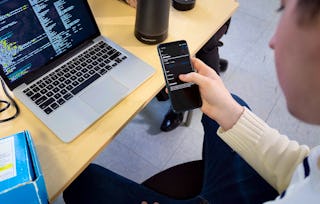Whether you are a member of the natural or human science community, if you are a PhD student, professor, part of an academic department or international research team, or self-employed and you wish to showcase your work to a wider audience then this is the perfect course for you. You will learn how to promote your work to professional peers, the general public, as well as the media.

Promote your Scientific Results
Ends soon: Gain next-level skills with Coursera Plus for $199 (regularly $399). Save now.

Recommended experience
What you'll learn
How to prepare a clear and concise professional pitch of your research domain and recent work that can be adapted to various audiences.
Fine-tune key public speaking skills for presenting, answering questions, and networking during scientific and media events.
Gain a sound understanding of the expectations of journalists when being interviewed by the press.
Skills you'll gain
Details to know

Add to your LinkedIn profile
See how employees at top companies are mastering in-demand skills

There are 6 modules in this course
In this first introductory module, we will help you get acquainted with each other and the course objectives. We will also offer tips on how to get the most out of this course. These tasks are to be combined with the work you do in Week 1.
What's included
1 video2 readings2 discussion prompts1 plugin
Welcome to the first week of this course entitled "Structure your Ideas." Cécile Michaut will be your communication coach for this week. Here is what you will be doing with Cécile: Identifying your No. 1 objective for promoting your research and your main message; adapting your message to a variety of audiences and contexts; knowing when and how to limit jargon; putting everything together in a short and concise pitch of your work.
What's included
7 videos1 reading1 peer review5 discussion prompts
Welcome to Week 2 of the course entitled "Enhance your Scientific Presentations. Bethany Cagnol will be your coach for this week. One of the key features of this module is it can be adapted to presentations you give in front of your peers, but also the general public. In this module, you'll cover some presentation basics just to get you off on the right foot. Then, we'll cover some key language points that you should keep in mind. Next, Bethany will give you her top tips for online presentations as well as panel discussions. And finally, we'll end the module with a Case Study in which you'll study a 45mn video from the NASA's "Maniac" series given by the international climate expert and University of Georgia professor, Dr. J. Marshall Shepard, who gave us permission to use this video as an example of good scientific presentation skills. Finally, be sure to check out the Resources section of this course for some valuable take aways to use for your next scientific presentations. In the forum, let us know if those help you, or if you'd like us to add other resources.
What's included
6 videos1 reading1 assignment1 discussion prompt1 plugin
In this module, we will be addressing Question and Answer sessions (a.k.a. Q & A sessions). You will have plenty of opportunities to self-reflect and study good and not-so-good examples in this highly unique, interactive module designed by your coach for this week, Sinead Namur. She will guide you through two hypothetical Q in A scenarii in which a professor, Dr. Johnson, is confronted with very tough questions from audience members. In these two scenarii, you will have the opportunity to reflect on what works and what doesn't. And at the end of the module, you will be given some key no fail advice and phrases that you can use, if and when you are faced with a tough Q&A session. TOP TIP: This could be quite an intensive week for you as almost every video has integrated self-reflective prompts. You can use the Note section to store your thoughts, but we suggest you keep a back up of all your notes on a separate document on your computer or notebook just in case. That way they are easy to find right when you need them.
What's included
6 videos1 peer review
In this module, your coach, Bethany, covers the importance of networking in the sciences with both our peers and outside our professional contexts. A collection of experts agreed to offer their input and share their experience with you. First, Mary Ann Horn, a Mathematics professor at Case Western Reserve University and a Former NSF Program Director in Applied Mathematics, will offer advice on the importance of cross-disciplinary networking as well as how networking ties into applying for grants. Next, we'll hear from Armelle Rancillac, a research fellow in neurobiology at the prestigious Collège de France and INSERM. She will speak about networking at public outreach events and on social media. Then, we'll hear from Mahasti Saghatchian, a medical oncologist and Vice President of the medical board at the American Hospital of Paris. She will stress the importance and benefits of networking on social media for the medial industry and patients. And finally, the president of Télécom Paris, Nicolas Glady, will offer his advice on networking in Academic and Corporate Contexts and what researchers should keep in mind when reaching out to business angels.
What's included
6 videos1 assignment1 discussion prompt
In this course's final module, Cecile Michaut is back as your coach and she's gathered an all-star team of experts to help you communicate with the media. First, you'll hear from Frédéric Restagno, a CNRS professor of physics, on his first-hand experience on what it's like to work on television. Then, Cécile will offer key tips to get you started on your journey with the written press and web publications. Next, journalist Catherine de Coppet will offer learners no-fail advice for interviewing on the radio and how you can set the foundation for getting invited back again and again. Then, Audrey Mikaëlian will cover the realities of television appearances whether they be for pre-recorded or live interviews. Cécile will then sum up the module with essential advice on building a sustainable relationship with the media. And be sure to check out Bethany's "Last Word" of the course on what you can do with your newly developed skills.
What's included
6 videos1 peer review1 discussion prompt
Instructors



Offered by
Explore more from Research Methods
 Status: Preview
Status: PreviewUniversity of Colorado Boulder
 Status: Free Trial
Status: Free TrialUniversity of Colorado Boulder
 Status: Free Trial
Status: Free TrialUniversity of Colorado Boulder
 Status: Preview
Status: PreviewIllinois Tech
Why people choose Coursera for their career





Open new doors with Coursera Plus
Unlimited access to 10,000+ world-class courses, hands-on projects, and job-ready certificate programs - all included in your subscription
Advance your career with an online degree
Earn a degree from world-class universities - 100% online
Join over 3,400 global companies that choose Coursera for Business
Upskill your employees to excel in the digital economy
Frequently asked questions
To access the course materials, assignments and to earn a Certificate, you will need to purchase the Certificate experience when you enroll in a course. You can try a Free Trial instead, or apply for Financial Aid. The course may offer 'Full Course, No Certificate' instead. This option lets you see all course materials, submit required assessments, and get a final grade. This also means that you will not be able to purchase a Certificate experience.
When you purchase a Certificate you get access to all course materials, including graded assignments. Upon completing the course, your electronic Certificate will be added to your Accomplishments page - from there, you can print your Certificate or add it to your LinkedIn profile.
Yes. In select learning programs, you can apply for financial aid or a scholarship if you can’t afford the enrollment fee. If fin aid or scholarship is available for your learning program selection, you’ll find a link to apply on the description page.
More questions
Financial aid available,
¹ Some assignments in this course are AI-graded. For these assignments, your data will be used in accordance with Coursera's Privacy Notice.

